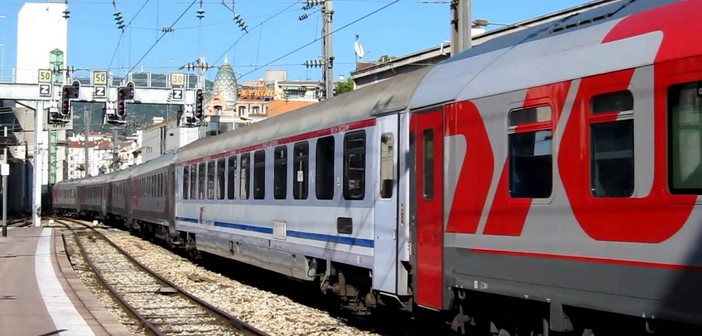Yesterday morning, the authorities, accompanied by various stakeholders from Nice and Russia, celebrated the 150th anniversary of the opening of the railway line that connects Moscow to Nice.
The train that arrived at Nice station from Moscow symbolized a new “journey” with a better quality offer compared to the one in place for the past five years*. It is now a train hotel with modern carriages and appropriate services awaiting passengers for a two-day and two-night discovery journey over more than 3,000 kilometers (exactly 3,315, crossing 7 countries).
7,000 people per year take it.
On this occasion, the two railway presidents, Guillaume Pepy (SNCF) and Vladimir Yakunin (RZD), made the trip to show their agreement and sign a collaboration protocol. The president of the French railway company announced its participation in the project to construct the high-speed line Moscow-Kazan (Capital of the Republic of Tatarstan). Just as a reminder, the Russian railway network is the second-largest in the world in terms of extension.
The formal speeches by political authorities, Ambassador Alexander Orlov, and Nice’s mayor Christian Estrosi did not go beyond the protocol, although the latter wanted to recall the historical and current ties between Russia and Nice and express his friendship and support for the Russian people.°
Not to forget his critical stance towards foreign policy (French? European? International?) on Russia, in the context of the Ukrainian conflict, about which he had already spoken on several public occasions, showing that he had chosen his side.
We know Christian Estrosi’s tendency for constant controversy against the French government, which participated in developing and enforcing economic sanctions against Russia, including the non-delivery of frigates ordered by the Russian navy and built in the Saint-Nazaire shipyards.
We also know his tendency to mix the many hats of his public roles – present, future, and upcoming – and his all-terrain application. This also contributes to the quality and charm of his persona, and maybe, it is one of the keys to his undeniable political success.
Furthermore, no one can prevent him from expressing himself freely on any subjects he wants. Simply, sometimes, being the mayor of the fifth-largest city in France, as he likes to remind, should it not suggest more caution on “sensitive” topics, especially those not within his function’s domain?
In fact, on a personal level, one says and does what they want when speaking as a representative of a public office…
This methodological remark, in the utmost respect for the person, introduces successive facts: what need is there to take the microphone again to launch into a pro-Russia harangue, off-topic, without anyone feeling the need, much less the desire?
It was so true that RZD president, Yakunin, hurriedly said in turn that he has a “technical” responsibility and is not involved in political affairs… Not certain the Russian authorities would have appreciated him giving his own take!
However, there is nothing wrong with the Mayor of Nice stroking the patriotic sentiments of the Russian community residing in Nice and its surroundings (estimated at 2,000 people) and regretting that most likely the economic sanctions hinder Russian tourist flows to the Côte d’Azur.
It is also good that he tries by all means to create opportunities for exchanges in various fields of economic, cultural, and scientific activity, particularly within the OIN framework: Russia is a leading country in many areas, and any collaboration can only be beneficial for the capital of the Côte d’Azur.
There is also nothing serious if Christian Estrosi wants to play the paladin of Russia’s international policy and act as a fifth column in France: Everyone has their ideas, opinions, and objectives.
But, may we ask, why do it on a station platform on a Saturday morning during a protocol and festive event, in front of people who came for something entirely different, embarrassing the other authorities present? Especially in a field (transportation) that is not included in the international sanctions adopted against Russia.
Regarding an international policy theme, and being a Deputy, is there not an appropriate commission or the National Assembly’s hemicycle where Christian Estrosi could voice his opinion and considerations, certainly interesting and entirely legitimate?
As far as we know, neither the Municipal Council of Nice nor the Metropolis Council has competencies in international policy matters.
Moreover, the stunt comes particularly poorly on the day when (pro) Russian troops launched a new offensive in the Mariupol region, causing dozens of civilian deaths. Just to recall that the problem is far more complex and would deserve a more appropriate analysis, debate, and forum than a few catchy phrases.
Finally, a comment seems in line with these facts: This Saturday, January 24, was the feast of Saint Francis de Sales, considered by the Catholic Church as the patron saint of journalists, writers, communicators (proclaimed January 26, 1923).+
Pope Pius XI dedicated him for his works with the encyclical Rerum Omnium Perturbationes, demonstrating Saint Francis de Sales’ reformative will (in his time’s context).
To him, to all communicators in any capacity (Christian Estrosi is one through his public functions) but with the same responsibility deriving from information, the virtuous indication: “good does not make noise, noise does not do good.”
Christian Estrosi concluded his controversial speech by saying (to himself?): “I know it is not politically correct, but it feels good.”
We do not doubt it, but the question arises: Was he right to do so?
The answer still lies in Saint Francis de Sales’ teaching: “To each his own conscience!”


